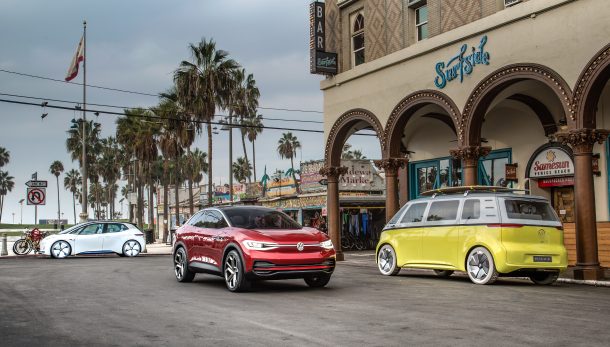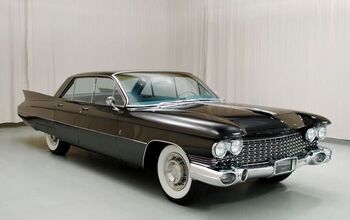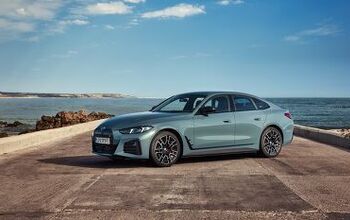Volkswagen's Not Ruling Out an Electric Tie-up With Ford

Pretty much everything is on the table at this point. At least, that’s the way it looks to industry observers. The partnership announced between Ford and Volkswagen back in June has the potential to birth any number of outcomes — from jointly developed commercial vehicles (the initial aim), to badge-swapped overseas small cars, autonomous vehicle hardware, and perhaps even borrowed electric vehicle architecture.
As it prepares the launch of its MEB-platform electric vehicles, Volkswagen’s not saying “no” to letting Ford have a piece of the action.
Of course, it’s not saying “yes” either. Speaking on a conference call Tuesday, Volkswagen chief financial officer Frank Whitter said the company is open to new hookups, Automotive News reports, but wouldn’t say whether or not its MEB architecture would ever be up for grabs.
“Whether we might provide access to other brands outside of the VW Group is theoretically possible, but there is no decision,” Whitter said.
Having access to VW’s EV architecture would be a cost-saving boon for Ford, which begins its electric product push with the release of a sporty crossover in 2020. At this year’s Detroit auto show, Ford announced plans to release 40 electrified models by 2022, 16 of which would be fully electric. To do this, the automaker will spend $11 billion.
VW’s first MEB vehicle, a compact hatchback, starts production in November 2019. Following that, a crossover and reborn Microbus appear, with production eventually leaving Germany for the U.S. and China. Those latter two models likely have a home in Tennessee.
All told, VW aims to build 10 million electric vehicles using its new architecture. One of the brand’s main areas of focus is the Chinese EV market — a cash-rich cornucopia of state-incentivized green vehicle buyers. It’s a market Ford, which saw its Chinese operations hit a towering roadblock in recent months, would definitely like a larger slice of.
Platforms aside, Whitter said VW is eagerly looking to lower future costs by partnering with big players in the autonomous driving field.
“It’s no secret that this is very expensive to develop and that there is the one or the other that is far ahead, such as Waymo in the U.S., so we are naturally thinking about how we can narrow the lead. Or if this isn’t feasible, how we can strengthen our own activities,” Whitter said. “There’s no final decision.”
[Image: Volkswagen]

More by Steph Willems
Latest Car Reviews
Read moreLatest Product Reviews
Read moreRecent Comments
- 28-Cars-Later Say it ain't so, so reboot #6* isn't going to change anything?[list=1][*]V4-6-8 and High "Tech" 4100.[/*][*]Front wheel drive sooooo modern.[/*][*]NOrthSTARt.[/*][*]Catera wooooo.[/*][*]ATS all the things.[/*][*]We're *are* your daddy's Tesla. [/*][/list=1]
- MaintenanceCosts Can I have the hybrid powertrains and packaging of the RAV4 Hybrid or Prime with the interior materials, design, and build quality of the Mazda?
- ToolGuy I have 2 podcasts to listen to before commenting, stop rushing my homework.
- ToolGuy Please allow me to listen to the podcast before commenting. (This is the way my mind works, please forgive me.)
- ToolGuy My ancient sedan (19 years lol) matches the turbo Mazda 0-60 (on paper) while delivering better highway fuel economy, so let's just say I don't see a compelling reason to 'upgrade' and by the way HOW HAVE ICE POWERTRAIN ENGINEERS BEEN SPENDING THEIR TIME never mind I think I know. 😉


































Comments
Join the conversation
"Electric tie-up"? And I thought Bertel Schmitt had moved on.
The Tesla Effect: An Elon Musk Adventure